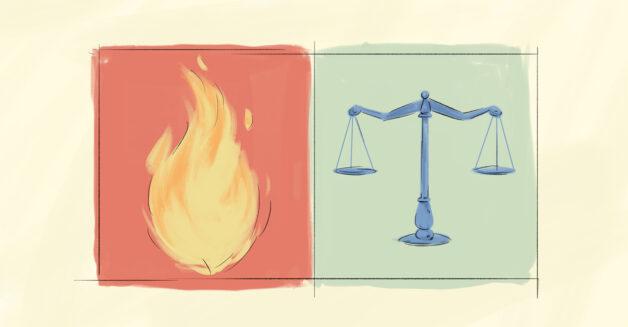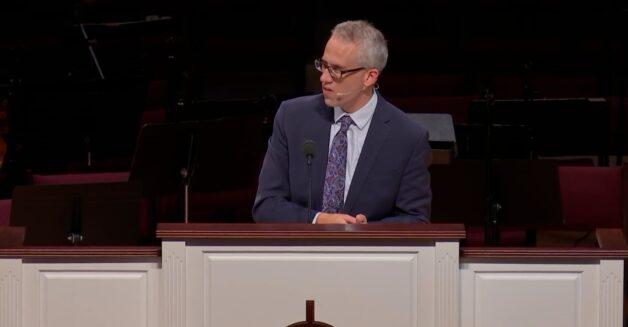
Guest Blogger: Jason Helopoulos
We have much to be thankful for in the recent discussion regarding justification and sanctification in the Reformed community. And it appears that this will continue to be a discussion for years ahead. First, I am thankful for the renewed zealousness and commitment to the doctrine of justification. It seems every few decades this doctrine needs to be reconsidered and appreciated due to some assault upon it. Second, I am thankful for the seriousness with which some are looking at the doctrine of sanctification. The Reformed community throughout its history has always maintained a strong teaching on the Christian life and the “working out” of our salvation by the Spirit.
However, one position of the recent discussion is of concern. In some of the current conversation it has been advocated that sanctification purely flows out of our justification.With this tact the Christian is encouraged to merely look back to the reality of their justification in order to grow in sanctification or we are told that sanctification is just “getting used to our justification.” But often missing in this pastoral advice or theology is the essential and necessary doctrine of union with Christ. This doctrine also has a long and robust history in the Reformed community. One only needs to think back to Calvin to realize how important this doctrine has been in our circles. Dr. Richard Gaffin in a short article entitled, “Justification and Union with Christ” (which can be found in Theological Guides to Calvin’s Institutes edited by David Hall and Peter Lillback) states:
“…for Calvin sanctification as an ongoing, lifelong process follows justification, and in that sense justification is ‘prior’ to sanctification, and the believer’s good works can be seen as the fruits and signs of having been justified. Only those already justified are being sanctified. But this is not the same thing as saying, what Calvin does not say, that justification is the source of sanctification or that justification causes sanctification. That source, that cause is Christ by his Spirit, Christ, in whom, Calvin is clear in this passage, at the moment they are united to him by faith, sinners simultaneously receive a twofold grace (justification and sanctification) and so begins an ongoing process of being sanctified just as they are now also definitively justified” (p.256). (Made bold for our purposes)
Those encouraging us to purely “get used to our justification” or to “look back to our justification” are rightfully concerned about a “works righteousness” mindset among God’s people. They are fittingly holding up grace before the Christian’s eyes. I am thankful for that concern and share it. In no way should we diminish the centrality of grace and praise God that these voices are reminding the church. They are also rightly concerned that we acknowledge and know the freedom (Romans 6) that attends to the individual who has been justified. How essential it is that we know and dwell in this freedom of the Gospel. There is a true benefit to looking back to our justification. And yet we also want to be careful not to swallow up sanctification in the doctrine of justification (This appears to be the practical outcome for some as any exhortation or application to the Christian life which wanders outside of “look back to your justification” is met with the cry, “Legalism”)
But of even greater importance is that in trying to safeguard grace and the Gospel it is possible that some are unknowingly diminishing the center of the Gospel: Christ. It is from our vital union with Him that not only our justification flows, but also our sanctification. It is the doctrine behind both. Calvin states, “For we await salvation from him not because he appears to us afar off, but because he makes us, ingrafted into his body, participants not only in all his benefits but also in himself” (Institutes, 3.2.24). Robert Letham in speaking about Calvin’s view of union with Christ as articulated in his commentary on 1 Corinthians 11:24 says, “The first thing in union with Christ is that we are united to Christ himself; his benefits follow from the personal union that we are enabled to share” (Letham, Union with Christ, p. 105).
What are those benefits? They include justification and sanctification. Again Letham states Calvin’s view, “Union with Christ is the root of salvation, justification and sanctification included” (Letham, p.110). Calvin is by no means alone in this understanding. The Westminster Assembly clearly articulates this as well in the Westminster Larger Catechism. Question 69 asks, “What is the communion in grace which the members of the invisible church have with Christ?” Answer: “The communion in grace which the members of the invisible church have with Christ, is their partaking of the virtue of his mediation, in their justification, adoption, sanctification, and whatever else, in this life, manifests their union with him.”
Union with Christ is the essential doctrine behind not only our justification, but also our sanctification. And that we must never diminish. Justification is a declarative act. But as Calvin said in 3.1.1 of the institutes, “First, we must understand that as long as Christ remains outside of us, and we are separated from him, all that he has suffered and done for the salvation of the human race remains useless and of no value to us.” Union with Christ is essential and we must not neglect it in this ongoing conversation about justification and sanctification.
Again, is it helpful to look back to our justification? We must answer, “Absolutely!” But are we to merely look back to our justification? Or is our sanctification purely just “getting used” to our justification? The answer to those questions must be, “No.” Does sanctification logically proceed from justification? Yes. But it finds its basis in our union with Christ. As strange as it sounds, because it is clearly not the intention of those advocating such, if we miss the fact that sanctification is a benefit which flows from union with Christ we can end up missing Christ. As Calvin says, “Not only does he cleave to us by an indivisible bond of fellowship, but with a wonderful communion, day by day, he grows more and more into one body with us, until he becomes completely one with us” (Institutes, 3.2.24).



